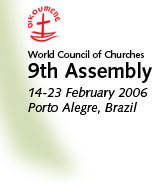 |
WCC > Home > News & media > News | ||||
| About the assembly | Programme | Theme & issues | News & media | |||||
 |
|
||||
|
23.06.04
Committee anticipates a "change in ethos and culture" as WCC moves towards consensus methodology
Free photo available – see below.
Changes planned in the WCC are a move towards "a new ethos and culture" with the potential "to strengthen and deepen the fellowship of churches". This was the view expressed by the Steering Committee of the Special Commission on Orthodox Participation in the WCC which met in Minsk, Belarus, 16-19 June 2004. Participants voiced support for changes in the WCC's decision-making and membership rules, and developed theological reflection on issues of ecclesiology. WCC general secretary Rev. Dr Samuel Kobia attended the event, and during his visit met with Belarusian religious and political leaders.
The Committee reviewed plans for a progressive introduction of a consensus methodology in WCC meetings. The proposals, to be tested during the WCC central committee in 2005, are designed to overcome the traditional divide between majority and minority votes, and to foster a new quality of collaboration. Kobia linked consensus to a search for "spiritual discernment" which could strengthen WCC's efforts in dialogue and advocacy. "Consensus opens the way to a new, more spiritual, culture for WCC," Kobia said.
The Special Commission on Orthodox Participation in the WCC was initiated by the WCC's eighth assembly in 1998 in response to sustained criticism of the Council by some of its Orthodox member churches. Following the report of the Special Commission in 2002, the Steering Committee has overseen the implementation of a series of recommendations. The meeting in Minsk was co-chaired by Bishop Rolf Koppe (Evangelical Church in Germany) and Metropolitan Gennadios of Sassima (Ecumenical Patriarchate).
According to Bishop Koppe, the Committee was able to take up "some of the most difficult questions that faced us in the Special Commission," and affirmed the commitment of churches to work and pray together while recognizing what continues to separate them. The Special Commission had identified divergencies in ecclesiology, or how churches understand themselves in relation to the undivided Church, as a fundamental obstacle in ecumenical relations. A full statement on ecclesiology, prepared by the WCC Faith and Order Commission, will be presented at the Council's ninth assembly in 2006.
The Committee was informed about plans for a clarification of membership criteria in WCC, and proposed ways of strengthening the understanding and reception of the Special Commission report and its underlying issues among the churches, in preparation for and during the 2006 assembly.
Speaking after the event, Metropolitan Gennadios emphasized the remarkable level of "trust, mutual confidence, and commitment" that characterized the work of the Committee and could provide an example for other areas of ecumenical work. "Of course, many difficulties persist, but we have reached a stage in our work where we can overcome hostilities, and find a common language and a new quality to our unity."
The Steering Committee meeting was hosted by the Saints Methodius and Cyril Christian Educational Centre of the Belarusian Exarchate, a part of the Russian Orthodox Church, and the largest religious community in the country. In addition to meetings with the head of the church Metropolitan Filaret of Minsk, informal discussions were held with representatives of other churches, and with leaders of the Jewish and Islamic communities. In parallel to the meeting, Kobia and other members of the Steering Committee addressed an international seminar on "Possibilities and Challenges of the Ecumenical Movement Today".
The WCC general secretary met with the president of Belarus, Alexander Lukashenko, on 16 June 2004. He was accompanied by Metropolitan Filaret and Rev. Leonid Kishkovsky (Orthodox Church in America), a member of the WCC executive committee. Kobia emphasized the value of dynamic inter-church initiatives in the areas of charity and education, including the independent theological faculty of the European Humanities University, and the Belarus Round Table, a forum for inter-church collaboration in social assistance and humanitarian aid. The meeting took place in a context of international concern about religious and political freedoms in Belarus.
The interim Steering Committee will meet once more prior to the WCC's ninth assembly in 2006, when a permanent committee will be appointed to continue the "authority, mandate, concerns and dynamic" of the Special Commission, the report of the Steering Committee noted.
Further information and background documents on the Special Commission are available on our website at: www.wcc-coe.org/wcc/press_corner/index-e.html
A high-resolution version of a photo from the meeting is available at: www.wcc-coe.org/wcc/who/sc-minsk-04.html
|
|||
|
|
|

